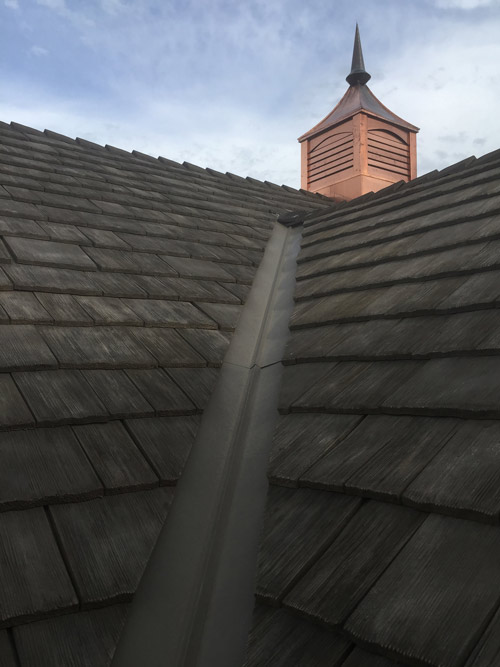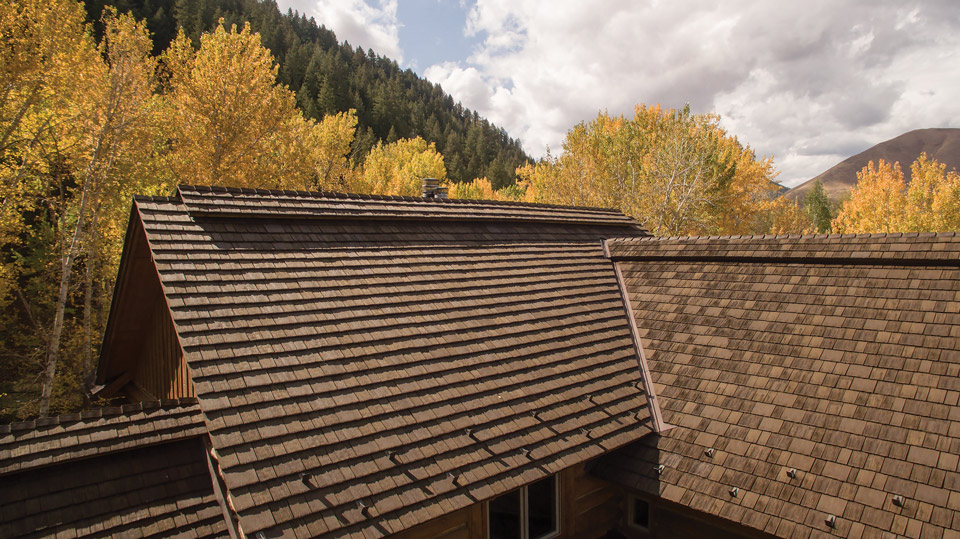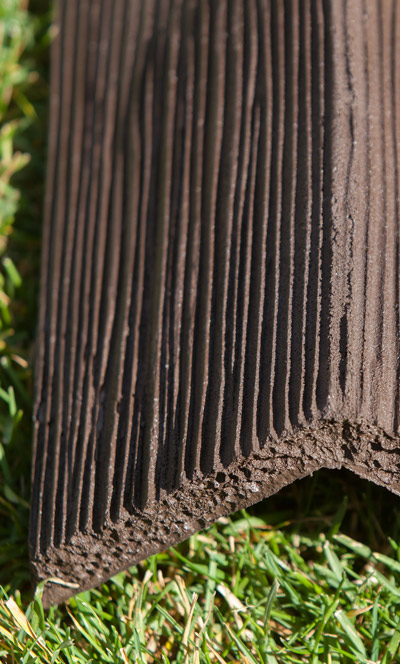The time has come to say farewell to natural cedar shakes, the roofing material so common to the Wood River Valley. It is simply too flammable for the high mountain desert. In response, Scott Miley Roofing has teamed up with CeDUR to install polyurethane synthetic shake roofs that meet fire safety standards while maintaining a traditional look that is difficult to discern from wood.
Scott Miley Roofing (SMR) has been building and replacing roofs in the Wood River Valley since 1992. As a locally-owned business, Scott Miley and his 18 employees are familiar with all that nature can blow, throw, and snow so that they can create roofs that keep homes safe and comfortable. One of Miley’s other strong areas of knowledge is fire safety. As a Hailey, Idaho, volunteer firefighter, he has been out on the fire lines while homeowners held their breath and waited.
“Sparks and ignited debris can be lifted and carried by convection currents up to a half-mile from the fire,” he explains, while stressing the importance of having a fire-resistant roof on all buildings. “Roofs are the most vulnerable part of the home because they present a large expanse where burning debris may land.”
Traditional cedar shakes have long been a favored local look that seems perfect for a mountain setting. However, wood catches fire easily and does not meet updated local building safety standards. The prospect that there could be natural and realistic looking synthetic shakes that meet Class A (combustible material) fire standards seemed too good to be true.
That is, until local roofing expert Miley found and mastered replacement products that made it possible to have the look of a traditional hand-split cedar shake roof and up-to-date fire protection. “We have been installing them for new roofs and replacements with excellent results, and they even meet many subdivision standards for the appearance of a shake roof.”
“We create our molds from natural cedar shakes in order to replicate their pleasing variations and unique grain patterns, and the appearance is very realistic.” – Jason Hyland CeDUR
REALISTIC REPLACEMENT FOR NATURAL SHAKES
A team in Colorado developed CeDUR shakes with the challenge of creating a synthetic product that looks like split cedar shakes. CeDUR Vice President Dave Dalton recounts: “We create our molds from natural cedar shakes in order to replicate their pleasing variations and unique grain patterns, and the appearance is very realistic. Other synthetic products that are on the market are polyethylene, which has a shinier and less realistic finish than our choice, polyurethane. The other products also have a cavity back, which creates issues for installation and can fill with debris and mold. In contrast, our CeDUR product is solid.”
Dalton continues, “In addition, with other firms’ polyethylene products, the whole system has to be certified fire safe, which essentially means that there must also be a fire-resistant underlayment. CeDUR shakes incorporate a fire retardant and meet standards without the additional requirement for a fire-resistant underlayment.”
When asked how consumers can be confident that CeDUR shakes meet the Class A fire standards, Dalton explains that an independent testing lab makes this finding, and CeDUR has posted the unbiased testing on YouTube (https://goo.gl/c73Oos).
He assures, “The findings are that natural cedar shakes burn at 375 degrees Fahrenheit, while CeDUR shakes will not ignite at 1,400 degrees Fahrenheit, which meets Class A fire standards, the local requirement.”
Dalton and colleague Jason Hyland explain that CeDUR also carries a Class IV impact rating, which is important for withstanding hail, resisting wind up to 115 miles per hour, and remaining invulnerable to freeze and thaw cycles. Another important consideration to note is CeDUR’s lightweight composition. “At 170 pounds per 100 square feet, there is no need for special structural engineering for a heavy roof, and as a replacement, it is similar to the original or lighter in weight,” Hyland clarifies.
While appearance is subjective, Hyland recently attended a local building site where the property manager was certain that the new roof was wood shakes, proclaiming, “It looks so convincing.” The look of CeDUR is so similar to that of hand-split cedar shakes that subdivision and developments known for consistency in wood shake appearance, like Weyyakin Ranch, have approved it for use.
CeDUR works closely with installers like SMR to warrantee the roofs. “Scott Miley Roofing has earned a certification for installing CeDUR roofs. When the roof is complete, CeDUR warrantees the roof for 50 years,” says Dalton.
LOCALLY-BASED SERVICE AND INSTALLATION
“There is a history of losing homes in this area to wildfires, and it is important that people protect their homes and buildings with the best fire-resistant roofing products they can find,” says Miley.
“I am pleased that CeDUR offers such a high level of protection, and at the same time, it has a pleasing natural look. We have so many beautiful homes in the area, and this is a product that works well to blend homes with their surroundings and to complement the other material choices.”
New roofs and replacement roofs in a variety of products are the core of SMR’s business, but additionally they make repairs, add skylights, and offer waterproofing. “People come to us for a long-term commitment where they can rely on us for service.” To better serve their customers, SMR also installs seamless custom copper rain gutters, custom fireplace caps, sheetmetal fabrication, waterproof exterior cladding, and metal siding. “Metalwork requires bending and fitting on site, and we have just upgraded our equipment for radius bends,” says Miley.
Because SMR is certified to install CeDUR shakes, a top local firm stands behind the workmanship and CeDUR stands behind the product. Such sure-fire, yet fire-safe, partnership is worth checking out.



